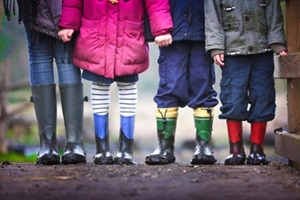Gender Identity and Autism

Multiple studies have shown that gender diversity occurs more often in autistic individuals. Gender diversity is a broad term that is often used to discuss gender expression and identity that differ from traditional cultural expectations of “male” or “female.”
Sexuality in autistic individuals has also been found to be more varied than in non-autistic individuals. Research studies have also indicated that a higher percentage of autistic individuals identify as lesbian, gay, transgender, or queer (LGBTQ) than the general population.
Gender diverse individuals or those who identify as part of the LGBTQ+ community are also at heightened risk for mental health difficulties such as anxiety and depression. Studies have found that autistic youth experience even higher levels of mental health symptoms and are more likely to engage in self-harming behaviors and/or have suicidal thoughts. Autistic youth are also more likely to face difficulties accessing gender-affirming care.
Some core characteristics of ASD including difficulty with flexible thinking, expressing emotions, communication, and executive functioning may make it more difficult for your child to share their challenges and/or advocate for themselves.
How Can You Help Your Child
 Support and listening is very important. Children need parents and other families to listen to their challenges. Respect and support their attempts at advocating for themselves is also essential. You can provide support by advocating for your child to health professionals, educational personnel, and peers.
Support and listening is very important. Children need parents and other families to listen to their challenges. Respect and support their attempts at advocating for themselves is also essential. You can provide support by advocating for your child to health professionals, educational personnel, and peers.
Use gender-affirming pronouns. Using your child’s affirmed pronouns (pronouns consistent with your child’s gender identity) fosters a feeling of acceptance.
Given the higher rate of gender diversity in autistic individuals, it will be important to talk with your child as well as with trusted health providers. Ongoing conversations about gender and sexuality are important to do and can aid in planning for interventions and therapies.
Monitor mental health symptoms and find appropriate supports/providers for gender-diverse and autistic youth.
Collaboration between autism specialists and gender care providers is essential to support your child throughout the process.
University of Colorado Anschutz Campus Programs
- Birds and Bees: An 8-session parent-only education group that focuses on strategies and support for caregivers of autistic pre-teens and teens through puberty.
- True Center for Gender Diversity: The TRUE Clinic, which stands for Trust, Respect, Understand, Emerge, is the only clinic in the Rocky Mountain area that is specifically set up to serve gender-diverse youth, adolescents, and young adults. Providers work on a multidisciplinary team and provide a range of services including puberty-blocking medicines, hormone therapy, gender counseling, and nutrition.
- The CU Anschutz LGBTQ+ Hub repurposes the Women and Gender Center formerly at CU Anschutz. On this website you will find information about services and resources provided by the LGBTQ+ Hub.
Colorado Program
- The Center on Colfax: The mission of The Center is to engage, empower, enrich and advance the lesbian, gay, bisexual, transgender, and queer community of Colorado.
Books
- Consent for Kids by Rachel Brian
- SEX by Heather Corinna
- The Autistic Trans Guide to Life by Yenn Purkis and Wenn Lawson
- The Every Body Book by Rache Simon
Websites
- Elevatus is a sex education program for individuals with a variety of disabilities
- Sex Ed for Self-Advocated provides information for autistic individuals